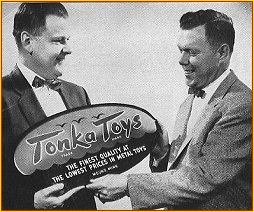An Interview with Gordon Batdorf
Following is a portion of a 2014 interview given by Gordon "Gordy" Batdorf to Liz Vandam. Batdorf was hired in 1947 by Avery Crounse to fill a bookkeeper position at Mound Metalcraft. He resigned his position as Chief of Operations, Tonka Toys, in 1969. The interview offers a first person look into "Tonka culture" that began in Tonka’s formative years and some would argue, was still a part of Tonka’s DNA when Tonka ceased manufacturing in the U.S.A. in 1997.
[Begin Interview]
 Gordon Batdorf Left and Ted Schafer |
LV: How did you become acquainted with the founders of Mound Metalcraft, Alvin Tesh, Lynn Baker and Avery Crounse, and come to work for them?
GB: After leaving the Air Force, Connie and I lived in Mound with her parents for a while and then in a small cottage next door. I attended night school at the Academy of Accountancy and got a part-time job as a bookkeeper with the Satterlee Company in Minneapolis. A coworker, Ray Hoffstead, suggested my name to a fellow looking for a bookkeeper for a startup company in Mound. I contacted the company, Mound Metalcraft, interviewed for the position with Avery Crounse and was hired on the spot. I will be forever grateful for Ray’s generous recommendation. LV: Mound Metalcraft was just getting started when you joined the company. What about the business interested you? GB: I needed a job and it was in line with what I was already doing. Avery Crounse impressed me. I noticed immediately that he had a twinkle in his eyes and looked like a nice person. My assessment of him was correct. Crounse was in the bookkeeping end of things and looking for a replacement for himself so he could spend more time on other projects within the company – he was glad to have me aboard. I believe they were making metal tie racks at the time. | |
LV: So, in 1948, you found yourself at this little start-up company working out of an old schoolhouse. Take me through the changes over the years.
GB: I hadn’t been there very long when Ed Streater from Spring Park came in with a toy truck and an offer to sell his tooling. We accepted his offer and with the switch to toy making came designer Charlie Groschen, also from the Streater Company. We changed the name from Mound Metalcraft to Tonka Toys at my suggestion. In the ‘60’s, the company was still privately held, but was being encouraged to go public. The New York brokerage firm that handled this suggested we start selling at $6 per share. The morning that the sales were offered and the market opened, a quick decision changed the share price to $12. By the close of the market day, we were selling at $18 and we all felt pretty good about it. In 1961, Lynn Baker retired due to his poor health. Russ Wenkstern, who I hired in the early 1950s, became president at my suggestion.

1947 Mound Metalcraft Logo
LV: You mentioned changing the company name from Mound Metalcraft to Tonka Toys. How did that happen?
GB: I was 90% of the reason we changed the name. At the first few toy fairs in New York, we weren’t very well known and sales were slow. Connie remembers making a poster for an early company display with the family glue and sprinkles. Sales manager Dave Thomson and I, with a few others from Tonka, would take turns riding up and down the elevator of the New York Hotel where our showroom is located. When several people were in the car, we would ask our folks if they had seen the new Tonka line, declare it fantastic and the best we had ever seen in all our New York trips. We think it made a difference because we experienced more traffic in the show area.
It was important that everyone knew the Tonka name and associated it with our toys. It just made sense. As more people began to know us as Tonka Toys, they had no idea that the toys were made by Mound Metalcraft.
LV: The early years of Tonka have a proud tradition of being a wonderful place to work. Past employees who gather to reminisce about working at Tonka, say the company was like an extended family. How do you remember the interaction between Tonka and the Mound community?
GB: Everyone knew the importance of Tonka to the village of Mound. Community business people pitched in to help us by the old Koehler house for additional office space. It was located next to the schoolhouse that became our first building.
Within the company, most of the gals from surrounding farms worked on the assembly line. It seemed like everyone who worked at Tonka lived in or near Mound. Our friendships became very important to us – – we were all so close. Social events were a highlight and an opportunity to thank our people for their efforts throughout the year – holiday parties for the children included presents, bonuses and turkeys for employees and special dinners at other times of the year to celebrate company successes. It was the kind of place where coworkers cared about one another and making toys for kids was a happy job. I’ve always said that the most important asset Tonka had did not show up on the balance sheet. It was the people who worked on the production floor.
[Interview Continues on Page 2]